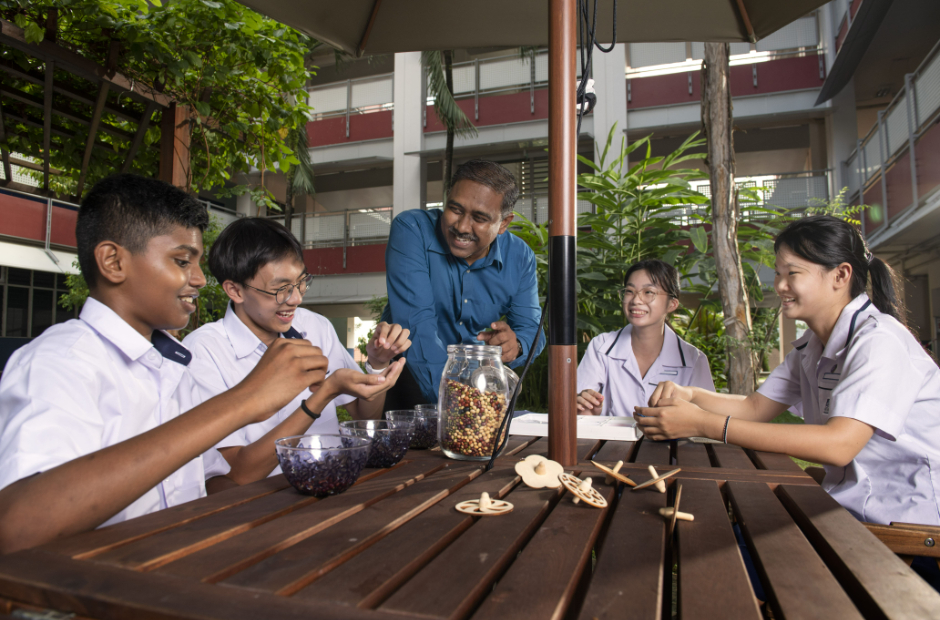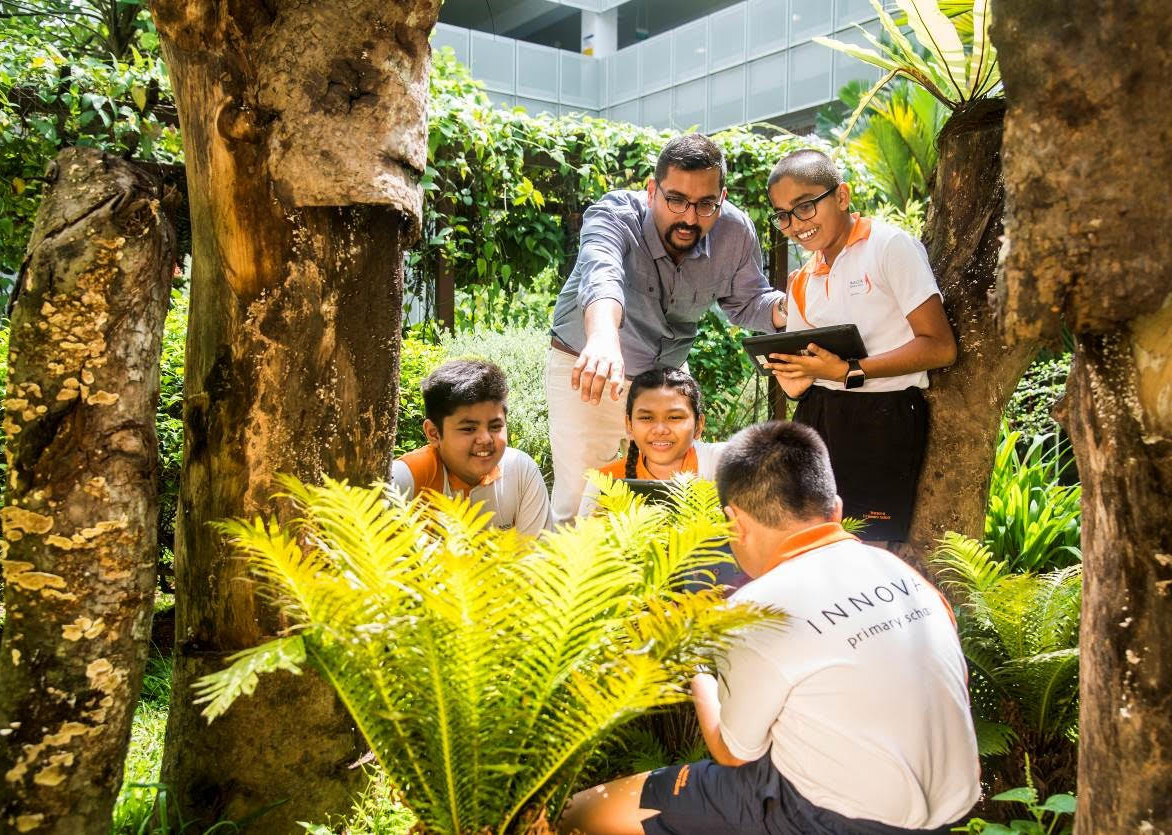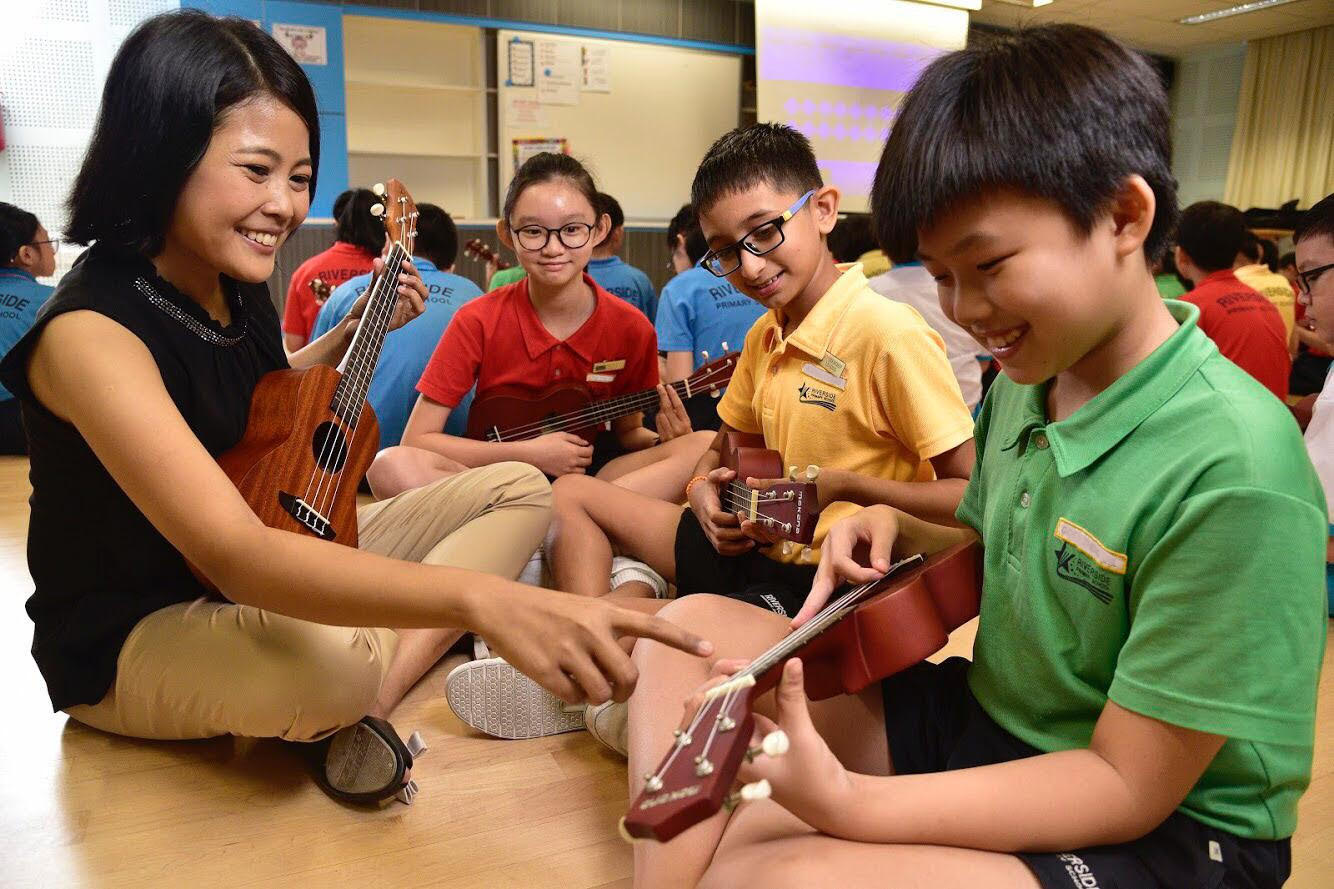As head of Student Management at Serangoon Garden Secondary School, Mr Shahul Hameed S/O Kuthubudeen takes on multiple roles in the lives of students at risk of dropping out of school. To many of them coming from low-income families or missing parental guidance at home, he is a mentor, a confidant and sometimes, even a surrogate parent.
In all these roles, the focus is not on disciplining but lending the social and emotional stability they need to stay in school and keep learning, he says.
It’s no easy task. Many of these students are frequently absent from school or affected by complex family issues and bad company. To give them the environment they need, Mr Shahul ropes in stakeholders and community partners to set up support systems to prevent them from falling through the cracks and back into old habits.
When the educator of 23 years is asked what his greatest contribution to teaching has been, he says, “While I have contributed to value-added results many times, I felt a greater sense of fulfilment when I was able to get a chronic long-time absentee student to attend his GCE N-Level exams. The student managed to move on to the post-secondary institution of his choice.”
Mr Shahul finds it hard to talk about the heart that went into the months and years of steering that boy to the point where he would show up for an exam. That day, when they caught sight of him at the school gates, he and his team of educators and counsellors exchanged texts and punched the air in joy.
This was followed by wordless tears which were quickly brushed away; no time to dally as other duties call. He says, “It brings a sense of fulfilment knowing that I have played a role in his development.”
‘It takes a child to raise a village’
Every student counts, which is why, even though the population of vulnerable students is small, the school ensures there are resources to support them. For this group of students, Mr Shahul initiated Project Five Degrees, or the snazzy-sounding P5D, which is now a signature programme of the school.
“Every degree of change is important because a small change can create a ripple effect and lead to a huge shift in their life trajectories.”
Mr Shahul Hameed S/O Kuthubudeen
His aim is to advocate for small degrees of changes in the habits of students who face challenges going to school; every five degrees of a 180-degree change is tiny but mighty, he explains.
“Every degree of change is important because a small change can create a ripple effect and lead to a huge shift in their life trajectories. Furthermore, it is difficult to expect large scale or major changes from these students who have not experienced much positive outcomes in their lives thus far.”
P5D is a customised learning structure, anchored on “a school within a school” concept. Students study three days in a week under the tutelage of the P5D team comprising subject teachers, counsellors, the education and career guidance counsellor and student welfare officers, and attend regular lessons for the next two days.
This works well for students who have been absent for a while and need a hand with re-integrating back to school life.
In this ‘mini school’, students get dedicated academic help in English, Mathematics and Science. When family or social-emotional issues crop up, the team works it through with the student. Meanwhile, Mr Shahul keeps a close eye on his students’ attendance and engages them in after-school activities.
Help does not stop at the school steps. Mr Shahul engages with the Ministry of Social and Family Development to get these students and their families the support they need in the community, such as securing jobs for the parents or housing for the family. With a secondment to SINDA under his belt and connections built with agencies like ComLink and MENDAKI over the years, Mr Shahul knows exactly where to go to secure academic support from volunteers, spark a sports initiative, or seek financial assistance from self-help groups.
“We want to stabilise them emotionally, so when they’re ready to go back into the classroom, they’ll be better-adjusted and ready to learn,” he explains.
After four to six weeks, the P5D students return to their normal class routine if their teachers deem they are ready, and are given certificates of accomplishment for displaying resilience in attending and completing the programme.
The results have been gratifying — absenteeism and offence rates fell, and grades climbed, with some of the students sitting for their N- and O-Level examinations by their final year in secondary school. Some also testified to seeing character progress in themselves.
“Raising a child is not a single person’s job,” Mr Shahul emphasises. “We need a village of educators, policy makers and community partners to get the job done. As my principal Mdm Valerie Goh says, it takes a child to raise a village. My role is to give our children and their families hope and dignity.”

After P5D, a centre for after-school care
Besides drawing on teacher feedback, Mr Shahul deploys data in resolving student issues. He draws data from various sources – including absenteeism records, counselling reports, even housing data and whether the families are on financial assistance – to gain rounded insights into the back story of each troubled child.
“We are very intentional in how we triangulate, review and sense-make the data. When I put all of it together, it tells me a powerful story, of why they’re unmotivated or not coming to school, for example. From there, I can quickly and accurately determine what they need,” he says.
Data helps in his design of the school’s programmes to better serve the different profiles of students in need. For example, he could better gauge the demand and types of activities needed for the school’s after-school programme, aimed at students who could use more structure after school.
Mr Shahul and team established a drop-in centre staffed by student counsellors every afternoon.
Every Monday, there is an outdoor element to their activities. There, the students can pick up more sports activities such as volleyball, street dancing and cycling, and activities are reviewed every term. To destigmatise attending the centre – imaginatively christened V-Garden after the distinctive ‘V’ formation of migratory birds who share a common direction – its doors are open to all students.
Listening to his father’s advice, he found his perfect job
Mr Shahul became a teacher because of his father, who saw education as a way out of the poverty cycle for the family. He was able to realise his father’s dream by being the first graduate in his family.
“He would tell me, we need to be successful so that we can help others succeed. That was the push I needed to go into teaching, and I eventually landed myself the perfect job as head of student management,” he shares.
He is a proponent of Restorative Practice (RP), which focuses on repairing relationships and restoring harmony when redressing an offence. In each scenario which he facilitates, offenders and victims are brought together and talked through the incident and consequences, so that reflection can take place. He explains, “In RP, the offender understands how the poor decisions he made has caused harm to others. That awareness is vital for him to accept that the punishment given is fair. No grudges are held at the end of the day.”
The results of all his efforts are clear when students start attending school regularly – and willingly. Come exam time, Mr Shahul and his team take turns reminding the students when to show up – and cheer when they complete a paper.
Mr Shahul’s voice chokes with emotion as he talks with pride about the students who eventually pass and move on to their next chapter, at the ITE, polytechnic or beyond. Some return to school on Teachers’ Day to say words of thanks to the teachers who have helped them. For some of the others, if they managed to stay out of trouble with the law, he counts that as a huge win too.
Parents, too, have been won over by his empathy for their wayward children. There was a mother who had practically given up on her child, until she saw the sincerity of his teachers in creating a better environment for him to study and grow up in and thus, had a change of heart towards him.
Says Mr Shahul, “I tell them, we are not here to complain about your child. Our students are always at the heart of what we do, so let’s work together.”






